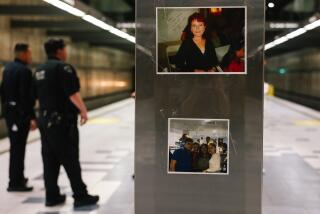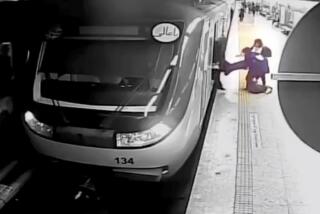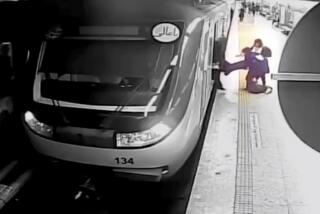Spain Hunts Fugitive Tied to Al Qaeda
- Share via
MADRID — The hunt for the masterminds behind last month’s train bombings here has targeted an accused Al Qaeda operative who, although a fugitive wanted in connection with the Sept. 11, 2001, terrorist attacks in the United States, may have returned clandestinely to Spain to oversee the train plot, investigators said Tuesday.
Witnesses told police they saw Amer Azizi, a Moroccan and longtime associate of several suspects in the train attacks, here after the March 11 bombings that killed 191 people, a senior investigator told The Times. Intercepted communications detected Azizi last year in Iran, where he was allegedly with Abu Musab Zarqawi, a Jordanian accused of leading an anti-U.S. bombing campaign in Iraq, Spanish investigators said.
The recent sightings of Azizi in Spain are a potential breakthrough in the train bombings. Since seven suspects blew themselves up during a shootout with police nearly two weeks ago, the investigation has centered on identifying lead figures who could have transmitted directives from the Al Qaeda network abroad to the train bombers, thought to be a predominantly Moroccan group based in Madrid.
New evidence suggests that Azizi was daring enough to return from the Middle East, sneak into Spain and oversee an attack by a relentless network that has widened its terror campaign to Western Europe in order to weaken the U.S.-led coalition in Iraq, investigators said. They added that if Azizi was involved, his orders probably came from Zarqawi or others in Al Qaeda’s core leadership.
“There are people who have seen Azizi here in Spain after the attacks,” a senior Spanish investigator said. “It looks like he came back and may have directed the others. If he was here, his background would make it likely that he was the top guy. We have reliable witness accounts that he was here in significant places connected to the plot. The idea of Azizi as a leader has become more solid.”
Sources willing to discuss the case requested anonymity because of the sensitive nature of the investigation.
Authorities issued an international arrest warrant for Azizi last week on general terrorism charges. At the time, police said that they did not have direct evidence linking him to the Madrid attacks, though they noted that top suspects -- including Jamal Zougam, a Moroccan immigrant shopkeeper currently in custody -- were his longtime followers.
Until now, authorities have said the operational leaders were Sarhane Abdelmajid Fakhet, 35, a Tunisian real estate agent, and Jamal Ahmidan, an alleged Moroccan drug dealer. Both died, along with five other suspects and a Spanish SWAT team member, in an explosion as police closed in on a hide-out in suburban Leganes. But authorities remained convinced that the plot was conceived at a higher level by someone with extensive knowledge of Spain and with international ties to Al Qaeda.
Azizi fits the profile, police say. Like several other suspects, he was an immigrant married to a Spanish woman and dabbled in export-import ventures in the late 1990s, according to court documents. He is charged with recruiting militants, acting as a point man for fraudulent documents, and serving as an accomplice of the Sept. 11 hijackers over a six-year period, according to court documents.
Telephone intercepts raised suspicions that Azizi helped set up a key meeting of Sept. 11 plotters Mohamed Atta and Ramzi Binalshibh on Spain’s northeast coast in July 2001, according to court documents. During that summer, the accused head of the Madrid cell was in close touch with Azizi and had conversations allegedly related to the mysterious sit-down with him and with others in which he said “Amer” was handling the arrangements, documents show.
Nonetheless, Azizi escaped a police roundup in late 2001 and fled the country. Subsequently, U.S. agents told Spanish investigators that Al Qaeda captives interrogated at the American base in Guantanamo Bay, Cuba, implicated Azizi as a direct accomplice of the Sept. 11 hijackers, according to a senior Spanish law enforcement official.
The investigation has established ties between Azizi and Moroccans implicated in both the train bombings and last year’s suicide bombings in Casablanca, Morocco. Azizi met in Turkey in 2000 with Salahadin Benayich, who was arrested in Morocco after Casablanca, and Said Berraj, an alleged train bomber who remains a fugitive, according to authorities and court documents.
Azizi allegedly operated in Turkey, Iran and possibly Iraq. That region is the turf of the Zarqawi organization, an increasingly autonomous network of Al Qaeda that has a presence throughout Western Europe as well. Investigators had recently said they thought Azizi had returned to Morocco, a conduit for illegal immigration and smuggling into Spain. He also has relatives and associates in France, according to court documents.
The focus on Azizi reinforces a portrait of the train bombers as a group who pulled off the catastrophic attack despite being well known to law enforcement -- and, in the case of some of them, under investigation at the time of the Madrid bombings.
The longtime extremists joined forces with others recruited from the criminal underworld, authorities said. Ahmidan, described by investigators as a drug dealer who is thought to have converted to Islam while in prison in Morocco, was known by the alias “Mowgli,” rode a motorcycle and had a flashily dressed Spanish girlfriend. He trafficked in hashish smuggled from his native Morocco, police say.
“They were a group of converted drug dealers who financed the attack with money they made selling drugs in Spain,” the senior investigator said.
The suspects used a load of hashish as part of the payment for the explosives they obtained from a Spanish ex-convict contacted through a jailhouse connection, the investigator said.
Meantime, Spanish police arrested six more suspects in the case, authorities said Tuesday. Two were captured in the southern city of Malaga. And British police were helping pursue leads in London, one of the cities to which the cornered suspects in Leganes made phone calls just before the explosion that killed them, investigators said.
More to Read
Sign up for Essential California
The most important California stories and recommendations in your inbox every morning.
You may occasionally receive promotional content from the Los Angeles Times.













